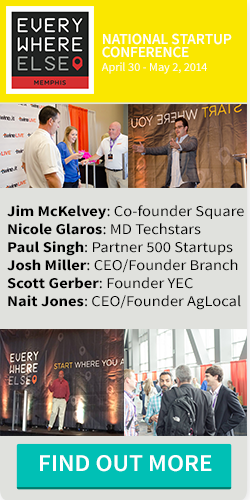What’s your startup called and what’s your big idea?
Mageca is the first app-store for interactive applications using 3D Sensors that recognize gesture, voice & vision. Our main goal is to create a web space where applications for a variety of uses can be found from the end-user. The latter can vary from a parent playing with its kids at their living room or a healthcare institute that needs a touchless solution for the sterilized environment of an operating room.
Mageca’s mission is to bring HCI technologies into people’s everyday life. We aim to become the reference point for Human Computer Interaction. We strongly feel that touchless technologies, gesture control & motion recognition enabled devices will become the next big thing regarding the way people interact with machines.
What’s the story behind your idea?
The marketplace aims to incentivize developers through offering them a space to promote their work while creating a community between sensors manufacturers, users and creators for the first time.
Who are the founders and what are their backgrounds?
We are a team of 3 enthusiastic entrepreneurs that came together 2 years ago. Antonis, is the founder of the company along with his 3 brothers that for the last 14 years have been working together for the last 14 years, building their company from scratch. It all started when they started the process of developing an application (using kinect) for their store- a virtual fitting room.Through this process we realized not only the great capabilities of the new technologies but the pain of users and developers that dont have a specific marketplace.
Galateia joined the team after she came back from London, having graduated from UCL with an Msc at TE Entrepreneurship, given her genuine interest in gesture- recognition technologies and experience working with startups at UK. Mariana, with an experience of 7 years in the retail industry and working as a costumer for the past 5 she is giving her valuable inputs regarding sales.
Our 2 great advisors: Savvas Georgiou, CTO at Daily Secret and Suneil Mishra, working with Primesense the past years are continuously helping with their contacts and deep knowledge of the industry we are operating in.
Where are you located, and what is the ecosystem like there?
Mageca is located in Greece, Athens. The start-ups scene has really exploded here over the last couple of years, and it’s been a real pleasure to watch. In 2013, Greek startups raised more than 55 million dollars in capital.
The country’s economy has been spiraling downwards for the last four years. That, has forced businesses and innovators to aim globally and think big.
Why now?
For Mageca, we believe that this is the ideal time & place to pursue our vision and embrace the opportunity arising around touchless technologies and be first movers in the industry.
What milestones have you reached?
Since we have been running the company since May 2013 we are proud to say that we have already reached significant milestones.
We have already established a network of 750 developers nationwide along with a base of registered users. Another major achievement is the support we have these 2 years from major companies operating in the industry. Microsoft, Intel, Tobii & Softkinetic are the companies providing us with developer’s kits for their new products, to review and use before their official launch.
Furthermore, we have managed to participate in worldwide events presenting our work, such is “TEDxAcademy”, “TEDxAUEB”, “Startup Turkey”, “Startup Berlin”, “Rising Ideas” and we were also sponsoring HackaNUI”. The past 3 months we were one of the winning startup companies participating in the biggest accelerator in Greece: “Cosmote Startup”.
What are your next milestones?
The goals we are aiming to achieve within the next 6 months is to secure a funding round that will enable us maintain the quality of application uploaded on site and further enhance the marketplace with new tools and services responding to the needs of our network of developers and sensors’ manufacturers. We are aiming to have 35 brand new applications uploaded on site within this period and extended customer base, including business clients such is hospitals and schools.
Our new redesigned website and appstore is about to be launched within May, with new apps and our blog with all the news and hot picks to keep an eye on around gesture recognition.
Where can people find out more?
We are always happy to get to know you!
You can reach us via
• Facebook : https://www.facebook.com/pages/Mageca/566846519998879
• Twitter: @MagecaLabs
• E-mail: info@mageca.com
and of course through the website: http://www.mageca.com/





 Danny Boice is the Co-Founder & President of
Danny Boice is the Co-Founder & President of  Steve has more than 25 years’ experience as an executive, inventor, investor, software developer, and technologist in the computer industry. On top of being the author of several award-winning programs, he is also the managing partner of the startup fund RadWeb Technology Partners, investor member of New World Angels, board member of the Miami Innovation Fund, and sits on the board of the Silicon Valley-based non-profit International Data Portability organization. He is also a member of the OpenAjax Alliance and the OpenWeb Foundation and frequently speaks on topics related to startups, crowd-funding, financing, advanced technology, Web 2.0, open source, data portability, and the real-time web. He also rode, and made the first investment in, the very first
Steve has more than 25 years’ experience as an executive, inventor, investor, software developer, and technologist in the computer industry. On top of being the author of several award-winning programs, he is also the managing partner of the startup fund RadWeb Technology Partners, investor member of New World Angels, board member of the Miami Innovation Fund, and sits on the board of the Silicon Valley-based non-profit International Data Portability organization. He is also a member of the OpenAjax Alliance and the OpenWeb Foundation and frequently speaks on topics related to startups, crowd-funding, financing, advanced technology, Web 2.0, open source, data portability, and the real-time web. He also rode, and made the first investment in, the very first 








 Startup founders face many questions during the process of turning their dreams into a viable, money-earning business. One of the most important questions that must be addressed in the process involves the legal structure of the company. Business owners need to decide whether or not to incorporate their business.
Startup founders face many questions during the process of turning their dreams into a viable, money-earning business. One of the most important questions that must be addressed in the process involves the legal structure of the company. Business owners need to decide whether or not to incorporate their business.